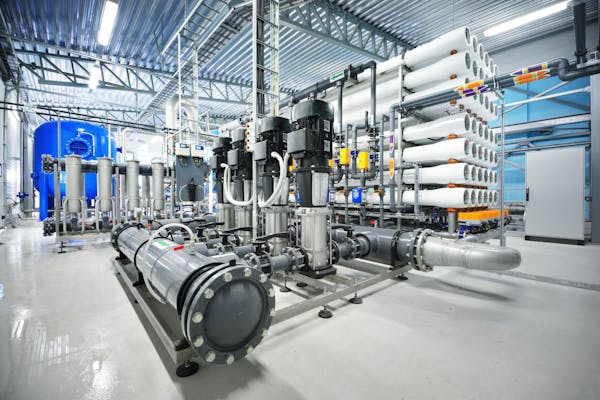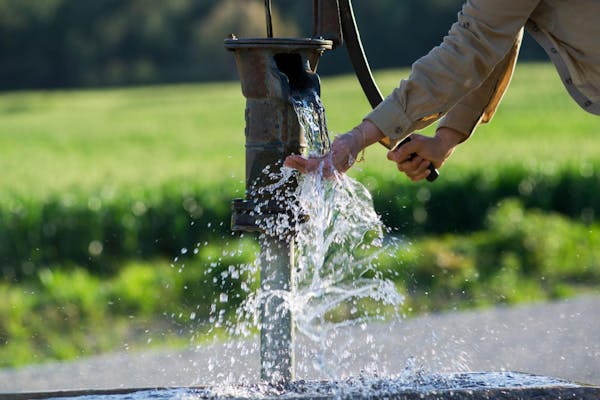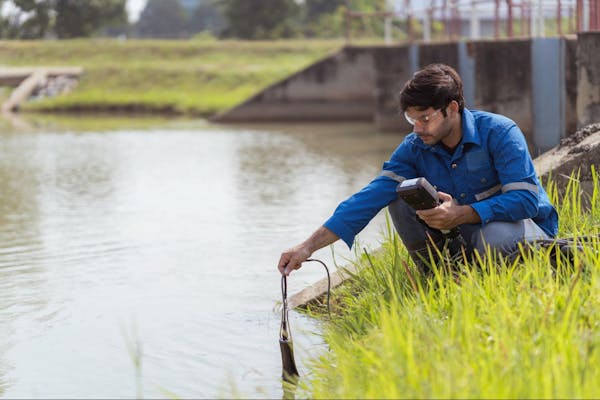May 2025
Diving Deep Into Well Water vs. City Water
The planet is covered in water. If you spin a globe and plunk your finger down randomly, there’s more than a 70% chance you’ll land on blue. But did you know that in terms of fresh, liquid water, there’s far more underground than there is on the surface? There is about 30x more water in underground aquifers than there is in fresh, surface water formations like lakes, ponds, and rivers.
This means there’s a really good chance that if you pay for city water, it's being sourced from an underground well just like a private well you might dig in your own yard. So, the question is, what’s the difference between well water vs. city water and is one better than the other?
What Is the Difference Between City and Well Water?
At its most basic level, city water is water your local municipality sources, treats, and delivers to your tap in exchange for you paying a monthly water bill.
Across the United States, all city water supplies have minimum standards for safety and quality set for them by the U.S. Environmental Protection Agency. Then on a state or local level, municipal water suppliers are free to set their own rules as long as they at least meet the EPA’s guidelines. An example of a local policy might be something like adding fluoride to the tap water to protect the oral health of residents. This is not required by the EPA.
Private well water is water from a well drilled for personal use on the homeowner's property. If someone drills a well on their own property, the water that comes out of the ground is not regulated for safety or quality. There is also no testing for any water contamination unless it’s done by the well’s owner.
Since no one delivers the water used by the well owner, they won’t be getting a bill each month for their home water usage but all costs associated with drilling and maintaining the well will fall on the owner’s shoulders.
Which Is Better: Well Water vs. City Water
Well water vs. city water isn’t a comparison that has an absolute winner. There are several reasons why city water might be better for you than well water, and of course there are several reasons it could be the opposite for you. The important thing to understand is that it all comes down to your unique situation.
To help you to understand which is better for you, we’re going to look at both individually.

Why Is City Water Better Than Well Water?
City water is better than well water in some ways. First, it’s more reliable. When parts of the infrastructure break down, there could be teams of people fixing it before you even realize there's a problem. If something in your well breaks down, it's not getting fixed until you get someone out to fix it.
Here are a few other ways city water can be better than well water.
High Safety Standards and Testing
City water is held to a high standard of safety and quality by federal, state, and local governments and it is monitored constantly by water experts. With regular testing from the water’s source all the way to your tap, if the quality of the water changes at any point in the journey, adjustments can be made on the fly.
Most water tests aren’t for problems that are perceptible to humans. These tests are often for contaminants that come in parts per million, billion, or even parts per trillion. This means they can catch water safety issues that otherwise wouldn’t have been noticed.
Reliable Cost of Water
With city water, you can be pretty sure what your bill is going to be each month if your water usage stays constant. In fact, if your water usage suddenly goes up, it could tip you off to problems like leaks before they cause costly damage to your home.
With a private well on the other hand, you could have a big unexpected expense on your hands if a possum decides to go belly up too close to your water source or anything else goes wrong with your well.
It’s Not Your Job
Another reason city water can be better is because if someone pollutes the city’s water supply, they can go after the polluters. If someone pollutes the groundwater around your well and it negatively affects your drinking water, you may need to lawyer up.
Doesn’t Require Electricity
City water doesn’t require electricity. To get well water out of the ground you’re most likely going to need a water pump, which runs on electricity. This means if your power goes out, your water is out too. Unless of course you have a manual well pump and don’t mind putting some muscle into it. With city water, losing power doesn’t mean you’ve also lost your water.
While city water isn’t perfect, you can be sure that when you turn on your tap, you’re getting water that has been tested and treated recently. When you turn on the tap connected to your private well, there are no guarantees unless you tested and treated it yourself.
Now that we know the pros of city water, let’s look at the arguments for well water.

Why Is Well Water Better Than City Water?
Well water is better than city water because you can drill a well almost anywhere and get to water if you go deep enough. This is important if you’re in a rural area and no public water supplier is sending water to your property. For some homeowners, well water is the only option.
Beyond it being the only choice for some folks, let’s look at a few other ways well water wins out.
No Monthly Water Bill
Well water isn’t exactly free water since it's up to you to dig the well and maintain it, but you won’t have a monthly water bill coming in.
More Control Over Your Water Quality
Your water quality is more under your control with a private well. If a company or person does something to damage your water quality, you can take it up with them directly.
Increased Property Value
Digging a private well in your yard could increase your property value as it adds a resource to your land. However, if given the choice, many potential buyers would rather have a reliable connection to a city water source.
Natural Disasters Are Less of a Concern
Private wells are also less susceptible to disruptions from natural disasters but that doesn’t mean you should ignore them. Big storms and other natural disasters can have seriously negative effects on your water quality. Check out these CDC recommendations for what to do if you own a well and have experienced a natural disaster.
Lower Chemical Usage
There won’t be any harsh chemicals (or even potentially harmful chemicals) like chlorine used in water treatment before it gets to you. There also won't be any additives like fluoride which you may or may not want. Just because your water doesn’t go through a treatment plant before it gets to you though, doesn’t mean you shouldn’t treat it yourself. Just make sure to use a high-quality water filter as part of your treatment process.
Well Water vs. City Water: Which Tastes Better?
While taste is subjective, many people consider city water that’s been treated with chlorine to taste unpleasant. Well water that comes right out of the ground and is full of minerals that some people enjoy. However, some well water can also be full of bacteria and sulfur compounds that make it smell like rotten eggs. No one enjoys that.
And again, just because a public water supplier hasn’t treated your water with chlorine doesn’t mean you shouldn’t. Drinking untreated groundwater from your faucet isn’t always safe.
Whether your tap gives out chlorinated city water or well water you’ve treated, a good water filter will help you remove the leftover chlorine and many other foul-tasting pollutants.

Well Water vs. City Water: Which Is Safer?
Whether your water comes from a deep hole in your yard or through miles of city-owned pipes, that water was sourced from nature. While city water gets tested and treated before it gets to your faucet, they can’t treat everything. There are thousands of contaminants — both natural and manmade — that can pollute water and the EPA only regulates about 90 of them.
Water from a private well is just as susceptible to these pollutants. Many times the underground aquifers a well taps into can extend out many miles in multiple directions. These aquifers can pick up contaminants close to your well or from far away.
Unfiltered groundwater is can contain:
- Heavy metals and sediment from soil
- Fertilizers, pesticides, and nitrates from home use and farm runoff
- Volatile organic chemicals from gas stations and street runoff
- Household chemicals like cleaners
- Commercial chemicals like PFAS from manufacturing processes
- Microorganisms like bacteria and viruses
- Microplastics from car tires and plastic pollution
- Hard water minerals like calcium and magnesium from rocks and soil
Municipalities will attempt to source water from the least polluted areas they can. Then they will usually use chlorine and UV filtration to kill microorganisms before physically filtering the water of sediment and debris using carbon or KDF filtration systems. Once it gets to your tap, it's up to you if you want to filter out the chlorine and anything they might have missed.
Can You Drink Well Water?
You can drink well water but it should be tested and treated with a water filtration system to ensure safety and quality. Drinking untreated water could carry health risks.
Do I Need a Septic System If I Have Well Water?
Everyone's situation is different but if you have well water, it’s most likely because your house isn’t hooked up to a city water supply. If they haven’t run pipes to deliver the water, there’s a good chance you’re also not hooked up to sewage lines. This means you'll need a septic tank to deal with waste.
Is Well Water Harder Than City Water?
Well water is groundwater and groundwater is hard water. Hard water is just water that has picked up minerals like calcium and magnesium from the rocks and soil it runs through. These hard water minerals aren’t harmful to ingest but they will wreck your pipes and water-using appliances. They’ll also stick to your surfaces and attract mold and mildew.
Well water is notoriously very hard water but most city water in the U.S. is considered hard water also because most of it also comes from groundwater.
If you’re dealing with hard water, a water softener or a salt-free water conditioner will make your life so much easier.
Is There Anything Else You Should Know If You Have Well Water?
Test, test, test.
If you have a private well, it can’t be stressed enough that no one is making sure you have clean water but you. The natural environment you’re getting your water from can change conditions rapidly without you realizing it.
If you’re not sure how to test your water or you're unsure what you should be testing for, take a look at this guide from the CDC that will help answer your testing questions and put you in contact with local water testing facilities.
Testing doesn’t just protect you from changing conditions that could cause you harm. Testing also establishes a record of water quality so if someone does something that damages your water supply, you can show the change in your water to the courts if necessary.
Finally, never drink unfiltered water from the ground without filtering it first. Bacteria and other compounds could be dangerous to ingest.

So Which Is Better? Well Water or City Water?
In the battle of well water vs. city water, there is no clear winner because each has their own advantages. You can dig a well almost anywhere and never pay another monthly water bill again. Just remember that it's up to you to make sure you have high-quality, clean water.
Meanwhile, city water isn’t always available where you need it but when it is, it’s usually safer and more reliable. City water doesn’t rely on your electricity to pump water out of the ground and if public water infrastructure ever breaks down, it’s the water company’s job to fix it.
No matter which option works best for you, installing a high-quality HomeWater Whole House Water Filter with add-on water softener will ensure you only get the best-tasting and cleanest water from your faucet. All of our water filters reduce contaminants like chlorine, heavy metals, and pathogens so you can enjoy every drop.